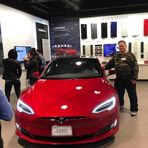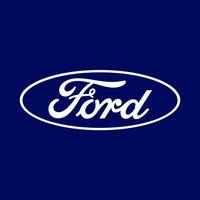The Electric Surge: Tesla and LG Energy Solution Powering the Future
October 8, 2024, 4:03 pm

Location: United States, Texas, Austin
Employees: 10001+
Founded date: 2003
Total raised: $3.86B

Location: United States, Michigan, Ypsilanti
Employees: 10001+
Founded date: 1896
Total raised: $40K
The electric vehicle (EV) landscape is evolving rapidly. Two giants, Tesla and LG Energy Solution, are at the forefront of this transformation. Their recent moves highlight the momentum and challenges in the EV market.
Tesla recently unveiled impressive statistics about its Supercharger network. In just one quarter, the company delivered a staggering 1.4 terawatt-hours (TWh) of energy. This is enough to power millions of homes for a month. The third quarter saw the opening of 2,800 new Supercharger stations, marking a 23% increase from the previous year. Tesla is expanding its network like a tree spreading its branches. Yet, there’s a twist. The pace of new station openings has slowed. Compared to the third quarter of 2023, the rollout dropped by 7.4%.
Despite this slowdown, Tesla claims its efforts have saved over 675 million liters of gasoline. That’s a monumental achievement. It’s like removing millions of cars from the road. The company also boasts a reduction of over 1.3 billion kilograms of CO2 emissions. These figures paint a picture of a cleaner future.
However, the landscape is not without its hurdles. Tesla has forged partnerships with several automakers, including Ford and Rivian. These alliances aim to broaden access to Supercharger stations. Yet, a recent agreement with General Motors (GM) has sparked controversy. While GM’s electric vehicles can now access Tesla’s network, owners must purchase a $225 adapter. This feels like a toll on the road to electrification.
The EV market is a double-edged sword. On one side, we have innovation and growth. On the other, challenges loom large. Major automakers like GM and Ford are grappling with declining EV sales. Buyers are hesitant, often citing affordability as a key concern. This hesitation casts a shadow over the industry.
Meanwhile, LG Energy Solution is making waves of its own. The South Korean battery manufacturer has signed a significant deal to supply batteries to a Mercedes-Benz affiliate in North America. This contract is set to span from 2028 to 2038, delivering 50.5 gigawatt-hours (GWh) of batteries. The deal has sent LGES shares soaring, reflecting investor optimism.
Yet, the specifics of the contract remain under wraps. The monetary value is a mystery, but the implications are clear. LGES is positioning itself as a key player in the EV battery market. Its clientele includes heavyweights like Tesla and Hyundai. This partnership with Mercedes-Benz further solidifies its status.
However, the backdrop is not entirely rosy. The broader EV market is facing headwinds. General Motors and Ford have reported weaker sales in the latest quarter. Consumers are cautious, weighing the costs of electric vehicles against their budgets. This trend raises questions about the sustainability of the current EV boom.
As Tesla expands its Supercharger network, it faces competition from other charging solutions. The race to build a robust charging infrastructure is heating up. Companies are vying for dominance, and the stakes are high. The future of EV adoption hinges on accessibility.
In this context, Tesla’s strategy of opening its Supercharger network to other manufacturers is a smart move. It’s like opening the gates to a bustling marketplace. However, the requirement for adapters may deter some potential users. The balance between exclusivity and accessibility is delicate.
The collaboration between LG Energy Solution and Mercedes-Benz signals a shift in the industry. As automakers pivot towards electric, the demand for batteries will skyrocket. LGES is poised to meet this demand. The partnership is a strategic play, ensuring a steady supply of batteries for future models.
Yet, the question remains: can the industry overcome its current challenges? The path to widespread EV adoption is fraught with obstacles. Affordability, infrastructure, and consumer confidence are critical factors.
In conclusion, the electric vehicle landscape is a dynamic arena. Tesla and LG Energy Solution are leading the charge, but they are not without their challenges. The future is bright, but it requires careful navigation. As the industry evolves, collaboration and innovation will be key. The electric surge is here, and it’s reshaping our world. The road ahead is electric, but it’s also complex. The journey is just beginning.
Tesla recently unveiled impressive statistics about its Supercharger network. In just one quarter, the company delivered a staggering 1.4 terawatt-hours (TWh) of energy. This is enough to power millions of homes for a month. The third quarter saw the opening of 2,800 new Supercharger stations, marking a 23% increase from the previous year. Tesla is expanding its network like a tree spreading its branches. Yet, there’s a twist. The pace of new station openings has slowed. Compared to the third quarter of 2023, the rollout dropped by 7.4%.
Despite this slowdown, Tesla claims its efforts have saved over 675 million liters of gasoline. That’s a monumental achievement. It’s like removing millions of cars from the road. The company also boasts a reduction of over 1.3 billion kilograms of CO2 emissions. These figures paint a picture of a cleaner future.
However, the landscape is not without its hurdles. Tesla has forged partnerships with several automakers, including Ford and Rivian. These alliances aim to broaden access to Supercharger stations. Yet, a recent agreement with General Motors (GM) has sparked controversy. While GM’s electric vehicles can now access Tesla’s network, owners must purchase a $225 adapter. This feels like a toll on the road to electrification.
The EV market is a double-edged sword. On one side, we have innovation and growth. On the other, challenges loom large. Major automakers like GM and Ford are grappling with declining EV sales. Buyers are hesitant, often citing affordability as a key concern. This hesitation casts a shadow over the industry.
Meanwhile, LG Energy Solution is making waves of its own. The South Korean battery manufacturer has signed a significant deal to supply batteries to a Mercedes-Benz affiliate in North America. This contract is set to span from 2028 to 2038, delivering 50.5 gigawatt-hours (GWh) of batteries. The deal has sent LGES shares soaring, reflecting investor optimism.
Yet, the specifics of the contract remain under wraps. The monetary value is a mystery, but the implications are clear. LGES is positioning itself as a key player in the EV battery market. Its clientele includes heavyweights like Tesla and Hyundai. This partnership with Mercedes-Benz further solidifies its status.
However, the backdrop is not entirely rosy. The broader EV market is facing headwinds. General Motors and Ford have reported weaker sales in the latest quarter. Consumers are cautious, weighing the costs of electric vehicles against their budgets. This trend raises questions about the sustainability of the current EV boom.
As Tesla expands its Supercharger network, it faces competition from other charging solutions. The race to build a robust charging infrastructure is heating up. Companies are vying for dominance, and the stakes are high. The future of EV adoption hinges on accessibility.
In this context, Tesla’s strategy of opening its Supercharger network to other manufacturers is a smart move. It’s like opening the gates to a bustling marketplace. However, the requirement for adapters may deter some potential users. The balance between exclusivity and accessibility is delicate.
The collaboration between LG Energy Solution and Mercedes-Benz signals a shift in the industry. As automakers pivot towards electric, the demand for batteries will skyrocket. LGES is poised to meet this demand. The partnership is a strategic play, ensuring a steady supply of batteries for future models.
Yet, the question remains: can the industry overcome its current challenges? The path to widespread EV adoption is fraught with obstacles. Affordability, infrastructure, and consumer confidence are critical factors.
In conclusion, the electric vehicle landscape is a dynamic arena. Tesla and LG Energy Solution are leading the charge, but they are not without their challenges. The future is bright, but it requires careful navigation. As the industry evolves, collaboration and innovation will be key. The electric surge is here, and it’s reshaping our world. The road ahead is electric, but it’s also complex. The journey is just beginning.
